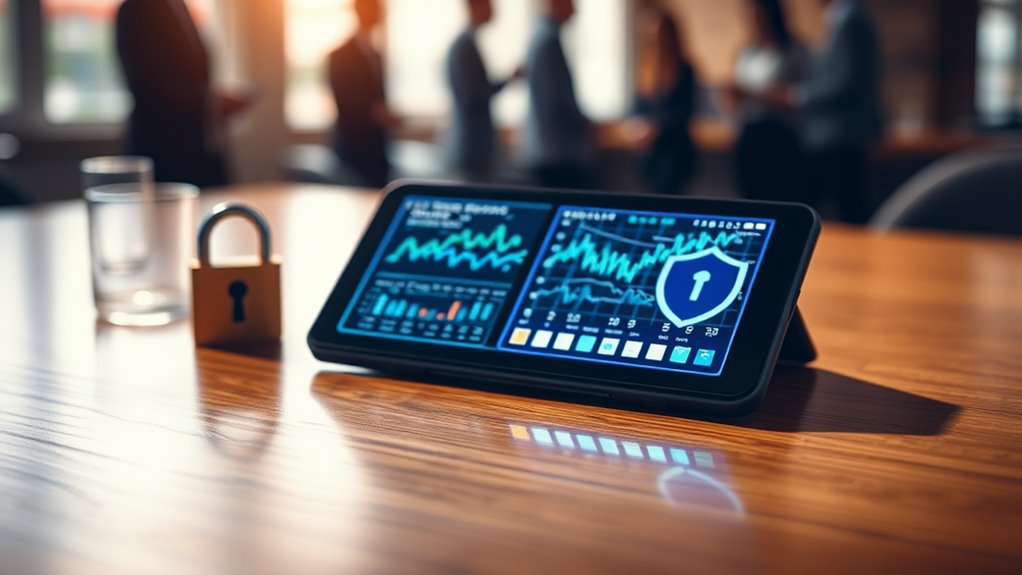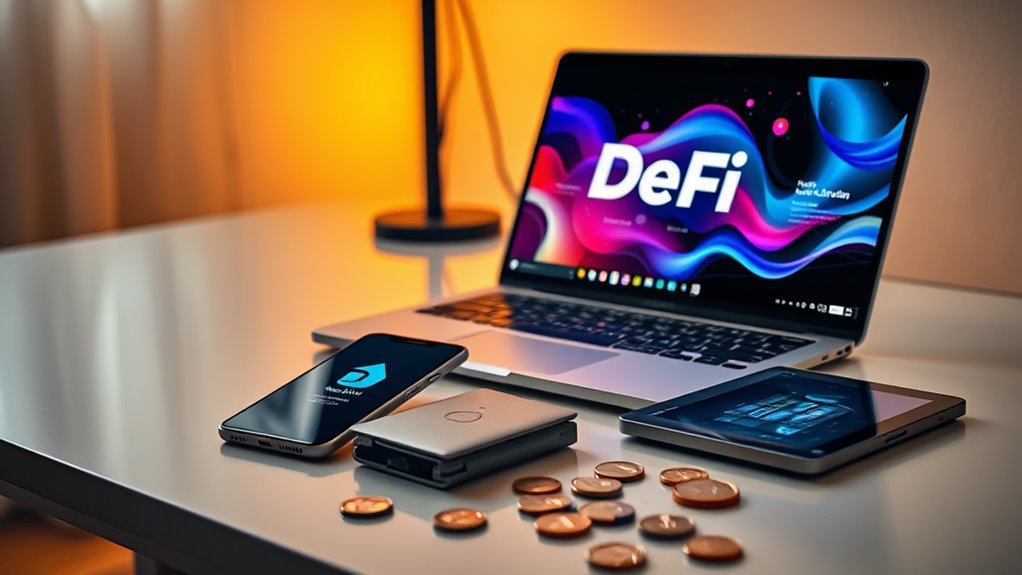
Using Crypto Wallets for DeFi: Unlocking Decentralized Finance Today
Crypto wallets are essential for accessing decentralized finance (DeFi), as they allow users to securely manage assets and interact with blockchain-based financial applications. DeFi wallets come in various types, including software and hardware options. Key features include user control over private keys, interoperability with multiple blockchain networks, and security measures like two-factor authentication. Users can engage in activities like trading, lending, and staking. To better understand the options available, one can explore the different features and benefits of DeFi wallets.
Key Takeaways
- DeFi wallets are non-custodial, allowing users to retain control over their private keys and assets while engaging with decentralized finance applications.
- They support multiple blockchain networks, enabling seamless management of diverse tokens and access to financial services like lending, borrowing, and trading.
- Key features include decentralized control, interoperability with dApps, enhanced security measures, and user-friendly interfaces catering to all experience levels.
- Users can engage in various financial activities, such as trading on decentralized exchanges, lending assets, and participating in yield farming.
- Selecting a secure, multi-chain compatible wallet ensures better management of assets while providing a gateway to the DeFi ecosystem.
Understanding DeFi Wallets

Understanding DeFi wallets is essential for anyone looking to navigate the world of decentralized finance.
A DeFi wallet is a specialized cryptocurrency wallet designed for interacting with DeFi applications. These wallets are non-custodial, meaning users retain full control over their assets and private keys. They integrate with various blockchain networks, allowing for the management of a diverse range of tokens.
DeFi wallets enable access to financial services like lending, borrowing, and trading without relying on intermediaries. Security is enhanced through the use of public-key cryptography, safeguarding transactions. Additionally, many DeFi wallets utilize smart contract functionality, providing users with programmable rules and enhanced security features.
Types of DeFi Wallets

As individuals explore the domain of decentralized finance, they encounter various types of DeFi wallets, each designed to meet specific needs and preferences.
Software wallets, such as MetaMask and Trust Wallet, offer user-friendly interfaces and support multiple cryptocurrencies. For instance, MetaMask is compatible with Ethereum and Binance Smart Chain tokens, while Trust Wallet allows for trading various digital assets.
Argent Wallet utilizes zkSync technology to reduce transaction costs, and Gnosis enhances security through multi-signature transactions.
Additionally, hardware wallets like Ledger and Trezor provide cold storage options, ensuring enhanced security for users. This enhanced security is particularly vital because non-custodial wallets allow users to control their own private keys, thereby minimizing the risks associated with third-party management.
Key Features of DeFi Wallets

DeFi wallets come equipped with several key features that enhance their functionality and user experience. One significant aspect is decentralized control, allowing users to maintain full ownership of their private keys and assets.
Interoperability is essential, enabling seamless interactions with various decentralized applications (dApps) across multiple blockchains. Additionally, security features such as biometric logins, two-factor authentication, and hardware wallet integration guarantee users’ funds are protected.
User-friendly interfaces cater to both beginners and experienced users, while real-time analytics offer valuable insights. Moreover, DeFi wallets facilitate direct access to financial services like lending and staking, promoting a versatile and all-encompassing management solution. Furthermore, the integration of AI-driven threat detection is enhancing security measures, ensuring that user funds remain safe from emerging threats.
Financial Activities With Defi Wallets

In the evolving landscape of finance, utilizing DeFi wallets offers a range of financial activities that empower users to manage their assets directly.
Users can trade assets on decentralized exchanges (DEXs) or conduct peer-to-peer transactions without intermediaries. Additionally, lending cryptocurrencies through DeFi protocols allows users to earn interest, while borrowing services enable them to access funds by using other cryptocurrencies as collateral.
Liquidity provision through yield farming can further generate returns. DeFi wallets also support staking and voting, integrating seamlessly with various DeFi applications. Moreover, the rise of decentralized finance is reshaping traditional financial services and fostering innovation.
Through these activities, users benefit from lower transaction fees, global accessibility, and enhanced control over their assets, ultimately fostering a more inclusive and innovative financial ecosystem.
Security Measures and Risks

In the world of decentralized finance (DeFi), ensuring security against unauthorized access is essential for protecting user assets.
Implementing measures such as two-factor authentication and using hardware wallets can greatly reduce the risk of breaches.
Additionally, users must remain aware of market volatility, as sudden price changes can impact their investments and necessitate careful management of their crypto holdings. Regular backups of wallet data and secure storage of recovery phrases are also crucial for safeguarding digital assets.
Preventing Unauthorized Access
Unauthorized access to cryptocurrency wallets is a common threat that users frequently face in the digital landscape. To enhance security, implementing two-factor authentication (2FA) is important, as it reduces the risk of unauthorized account access.
Users can adopt methods such as Google Authenticator or hardware devices like YubiKey, although SMS-based 2FA is susceptible to SIM-swapping attacks.
Additionally, securing wallets is essential; hardware wallets offer high-level protection by storing private keys offline, while hot wallets require strong security measures.
Users should prioritize safeguarding their private keys and recovery phrases, as losing these can lead to permanent asset loss. Staying informed about common threats like phishing attacks and exchange hacks is also crucial for maintaining the safety of your crypto assets.
Mitigating Market Volatility
How can individuals successfully navigate the challenges of market volatility in decentralized finance (DeFi)?
To mitigate risks associated with rapid asset value changes, investors can diversify their portfolios, spreading investments across various projects. Utilizing stablecoins, such as USDC or DAI, helps reduce exposure to price fluctuations.
Staying informed about market trends and adjusting portfolios regularly is also essential. Additionally, individuals should be aware of potential risks, including smart contract vulnerabilities and scams, which are prevalent in the DeFi ecosystem. Conducting thorough research on projects and engaging with reputable sources can aid in informed decision-making.
Moreover, implementing strong passwords with two-factor authentication can help secure digital assets against unauthorized access.
Ultimately, combining strategic investment approaches with a focus on security can greatly enhance one’s resilience against market volatility in DeFi.
The Future of DeFi Wallets

The future of DeFi wallets is poised for significant growth and innovation as they increasingly integrate with traditional finance systems. This evolution could enhance user access to financial services, making transactions more seamless and efficient. Additionally, the focus on user-friendly designs and multi-chain compatibility will likely drive wider adoption among both new and experienced users. Moreover, the rise of institutional adoption is expected to further solidify the role of DeFi wallets in the expanding crypto landscape.
Growth and Innovation Trends
As decentralized finance (DeFi) continues to gain traction, the growth and innovation trends surrounding DeFi wallets are becoming increasingly significant.
The global crypto wallet market is projected to grow at a compound annual growth rate of 24.8% from 2023 to 2030, driven by rising demand for secure and feature-rich options.
DeFi wallets are evolving to support multiple blockchains, enhancing user experience through seamless asset management. They are also integrating advanced features, such as AI for security and user interface improvements. Coinbase Wallet is one example of a platform that emphasizes user-friendliness while accommodating a wide variety of digital assets.
However, challenges remain, including regulatory uncertainty and security risks, which may hinder broader adoption.
Integration With Traditional Finance
Integrating decentralized finance (DeFi) with traditional finance presents a complex landscape of opportunities and challenges.
The regulatory environment poses significant hurdles, as traditional finance operates under strict regulations while DeFi lacks central oversight. Operational risks also concern traditional institutions, which may be wary of security issues and reputation damage.
Interoperability remains a barrier, as incompatible systems hinder seamless transactions. However, advancements such as tokenization of assets and the use of stablecoins can bridge these gaps.
Decentralized exchanges enhance accessibility while blockchain adoption improves security and efficiency. Collaborative models between DeFi and traditional finance can foster regulatory compliance and broader adoption, ultimately reshaping financial systems for increased accessibility and reduced costs. Moreover, as the regulatory landscape evolves, consumer protection measures will play a crucial role in integrating these two realms effectively.
Choosing the Right DeFi Wallet

How can individuals guarantee they select the most suitable DeFi wallet for their needs? To make an informed choice, users should consider several key features such as security, multi-chain support, and user interface. A well-rounded DeFi wallet will not only provide self-custody but also integrate seamlessly with popular DeFi applications.
| Feature | Description |
|---|---|
| Security Features | Biometric and two-factor authentication for safety. |
| Multi-Chain Support | Compatibility with multiple blockchains. |
| User Interface | Intuitive design for ease of use. |
| Integration Options | Works with various DeFi protocols. |
| Self-Custody | Users control their private keys and funds. |
Getting Started With Defi Wallets

What steps should individuals take to navigate the world of decentralized finance (DeFi) wallets?
First, they should understand the basics of DeFi, which operates on blockchain platforms like Ethereum.
Next, selecting a non-custodial wallet, such as MetaMask or Phantom, is vital, as these allow users to control their private keys.
After downloading and installing the wallet, individuals must create a new wallet and secure it with a strong password and seed phrase.
Following this, acquiring cryptocurrency through exchanges like Binance or Coinbase enables users to interact with DeFi applications.
It is also important to transfer funds to the personal wallet, ensuring full custody of assets, while being mindful of blockchain fees, especially on networks like Ethereum.
Frequently Asked Questions
How Do I Recover a Lost Defi Wallet Password?
To recover a lost DeFi wallet password, one must utilize the recovery phrase. If both the password and recovery phrase are lost, the wallet is generally unrecoverable, emphasizing the importance of secure backups.
Can I Use a Defi Wallet for Traditional Cryptocurrencies?
DeFi wallets, unlike traditional wallets focused solely on storage, enable seamless interaction with multiple cryptocurrencies, including Bitcoin and Ethereum. This multifaceted approach provides users enhanced flexibility and control over their assets across various blockchain networks.
Are Defi Wallets Compatible With All Blockchain Networks?
DeFi wallets are not universally compatible with all blockchain networks. While many support multiple chains, interoperability remains a challenge, necessitating the use of protocols, bridges, or wrapped tokens to facilitate seamless transactions across different platforms.
How Do Transaction Fees Work in Defi Wallets?
Transaction fees in DeFi wallets are influenced by network congestion, transaction speed, and blockchain choice. Users pay for processing through gas fees, service fees, and trading fees, which can vary considerably based on demand and platform.
Can I Transfer NFTS Using My Defi Wallet?
Transferring NFTs using a DeFi wallet is possible and involves selecting the NFT, entering the recipient’s address, and confirming the transaction. Users must also consider gas fees and verify the recipient’s address is accurate.
Conclusion
In summary, DeFi wallets play an essential role in accessing decentralized finance, enabling users to engage in various financial activities securely. For example, a user named Sarah utilized a DeFi wallet to lend her assets on a decentralized platform, earning interest without relying on traditional banks. As the landscape of decentralized finance continues to evolve, selecting the right wallet and understanding its features will be vital for participants to navigate this innovative financial ecosystem effectively.














